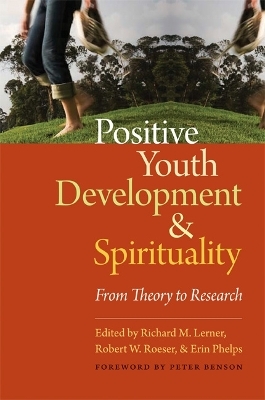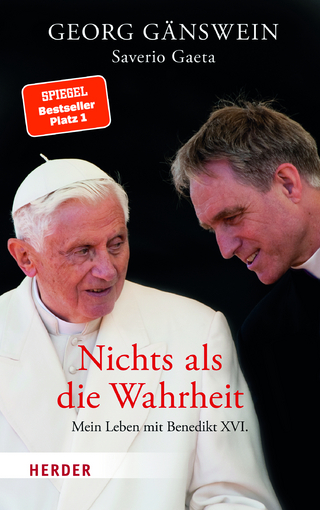
Positive Youth Development and Spirituality
Templeton Foundation Press,U.S. (Verlag)
978-1-59947-143-3 (ISBN)
- Titel z.Zt. nicht lieferbar
- Versandkostenfrei innerhalb Deutschlands
- Auch auf Rechnung
- Verfügbarkeit in der Filiale vor Ort prüfen
- Artikel merken
Bringing together a never-before-assembled network of biologists, psychologists, and sociologists, Positive Youth Development and Spirituality scientifically examines how spirituality and its cultivation may affect the positive development of adolescents.
Chapters provide groundbreaking new discussions of conceptual, theoretical, definitional, and methodological issues that need to be addressed when exploring the relationships between spirituality and development. Throughout the book, contributors recommend ways in which the research on the spirituality/positive youth development connection may be integral in building the larger field of spiritual development as a legitimate and active domain of developmental science. This volume, which is sure to be seen as a seminal contribution to a field in need of theoretical underpinnings, will be of interest to scholars and scientists in the fields of biology and the social and behavioral sciences.
Contributors include: Mona Abo-Zena, Jeffrey Jensen Arnnett, Peter L. Benson, Marina Umaschi Bers, Aerika Brittian, William Damon, Angela M. DeSilva, Jacquelynne S. Eccles, David Henry Feldman, Simon Gächter, Elena L. Grigorenko, Sonia S. Isaac, Lene Arnett Jensen, Carl N. Johnson, Linda Juang, Pamela Ebstyne King, Richard M. Lerner, Jennifer Menon, Na'ilah Sued Nasir, Guerda Nicolas, Toma´š Paus, Stephen C. Peck, Erin Phelps, Alan P. Poey, Robert W. Roeser, W. George Scarlett, Lonnie R. Sherrod, Gabriel S. Spiewak, Chris Starmer, Moin Syed, Janice L. Templeton, Heather L. Urry, and Richard Wilkinson.
Richard M. Lerner is the Bergstrom Chair in Applied Developmental Science and the director of the Institute for Applied Research in Youth Development in the Eliot-Pearson Department of Child Development at Tufts University. Erin Phelps is research professor and deputy director of the Institute for Applied Research in Youth Development in the Eliot-Pearson Department of Child Development at Tufts University. Robert W. Roeser is an associate professor of psychology in the Department of Applied Psychology at Portland State University and the senior program coordinator for the Mind and Life Institute. He received his PhD from the Combined Program in Education and Psychology at the University of Michigan (1996) and holds master’s degrees in religion and psychology, developmental psychology and clinical social work. In 2005 he was a United States Fulbright Scholar in India, and from 1999 to 2004 he was a William T. Grant Faculty Scholar. Dr. Roeser‘s research focuses primarily on how schools, as central cultural contexts of human development, affect both academic and nonacademic aspects of “whole persons” across childhood, adolescence, and emerging adulthood. He studies how variations in various features of middle and high school environments are associated not only with variations in patterns of achievement and educational attainments among U.S. adolescent students over time, but also in their motivation to learn and student identity commitments; their feelings of emotional well-being, stress and distress; and their behavioral conduct while in school. More recently, he has studied cultural identity development among urban adolescents during a period of rapid globalization in India; the emergence of a national identity among ethnically diverse youth in South Africa during the post-apartheid era; and the role of religion and spirituality in the positive development of immigrant youth in the United States. Although the primary focus of his research is on education and adolescent development in various nations, Dr. Roeser is also interested in teachers and how secondary school environments, as well as teacher education programs, can shape aspects of teachers’ professional identity development in ways that affect their success as teachers of adolescents. Currently, Dr. Roeser has established the Culture and Contemplation in Education Laboratory (CaCiEL) at Portland State University to study how the introduction of developmentally and cultural appropriate contemplative practices (i.e., mindfulness meditation) into mainstream schools may prove to be a novel way of reducing stress, enhancing well-being, strengthening motivation and self-regulatory capacity, and cultivating clear and compassionate forms of awareness among educators, staff, and students alike. The aim of all of this work is to advocate for and assist in the development of more culturally—and developmentally—informed, and more mindful, youth programs, teacher programs, school reforms, and governmental policies for children, youth, and their families.
Foreword / vii
Peter L. Benson
Preface / xi
1. Positive Development, Spirituality, and Generosity in Youth: An Introduction
to the Issues / 3
Richard M. Lerner, Robert W. Roeser, & Erin Phelps
Part 1 Conceptual Issues in Operationalizing Spirituality in Positive Youth Development
2. The Spirit of Spiritual Development / 25
Carl N. Johnson
3. Spirituality and Positive Youth Development: The Problem of Transcendence / 42
W. George Scarlett
4. Spirituality as Fertile Ground for Positive Youth Development / 55
Pamela Ebstyne King
5. Self and Identity Processes in Spirituality and Positive Youth Development / 74
Robert W. Roeser, Sonia S. Issac, Mona Abo-Zena, Aerika Brittian, & Stephen C. Peck
Part 2 Biological Contributions to the Spirituality- PYD Relation
6. Genetics of Faith: An Oxymoron Worth Examining / 109
Elena L. Grigorenko
7. Cooperative Behavior in Adolescence: Economic Antecedents and Neural Underpinnings / 128
Tomáš Paus, Simon Gächter, Chris Starmer, & Richard Wilkinson
8. How Religious/Spiritual Practices Contribute to Well-Being: The Role of Emotion Regulation / 145
Heather L. Urry & Alan P. Poey
Part 3: Individual Contributions to the Spirituality-PYD Relation
9. The Role of Developmental Change in Spiritual Development / 167
David Henry Feldman
10. Spirituality, “Expanding Circle Morality,” and Positive Youth Development / 197
Janice L. Templeton & Jacquelynne S. Eccles
11. The Role of Spirituality and Religious Faith in Supporting Purpose in Adolescence / 210
Jennifer Menon Mariano and William Damon
12. From “Worm Food” to “Infinite Bliss”: Emerging Adults’ Views of Life after Death / 231
Jeffrey Jensen Arnett
Part 4: Social and Cultural Contexts of the Spirituality-PYD Relation
13. Immigrant Civic Engagement and Religion: The Paradoxical Roles of Religious Motives and Organizations / 247
Lene Arnett Jensen
14. Ethnic Identity and Spirituality / 262
Linda Juang & Moin Syed
15. Considering Context, Culture, and Development in the Relationship between Spirituality and Positive Youth Development / 285
Na’ilah Suad Nasir
16. Application of the Ecological Model: Spirituality Research with Ethnically
Diverse Youths / 305
Guerda Nicolas & Angela M. DeSilva
17. Possible Interrelationships between Civic Engagement, Positive Youth Development, and Spirituality/Religiosity / 322
Lonnie R. Sherrod & Gabriel S. Spiewak
18. A Palace in Time: Supporting Children’s Spiritual Development through
New Technologies / 339
Marina Umaschi Bers
List of Contributors / 359
Index / 367
| Erscheint lt. Verlag | 24.9.2009 |
|---|---|
| Vorwort | Peter Benson |
| Zusatzinfo | 27 |
| Verlagsort | Radnor |
| Sprache | englisch |
| Maße | 152 x 229 mm |
| Gewicht | 540 g |
| Themenwelt | Religion / Theologie ► Christentum ► Kirchengeschichte |
| Religion / Theologie ► Christentum ► Moraltheologie / Sozialethik | |
| ISBN-10 | 1-59947-143-4 / 1599471434 |
| ISBN-13 | 978-1-59947-143-3 / 9781599471433 |
| Zustand | Neuware |
| Informationen gemäß Produktsicherheitsverordnung (GPSR) | |
| Haben Sie eine Frage zum Produkt? |
aus dem Bereich


